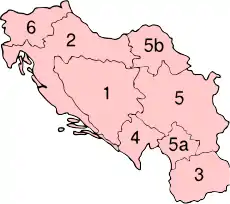United Nations Security Council Resolution 871
United Nations Security Council resolution 871, adopted unanimously on 4 October 1993, after reaffirming resolutions 713 (1992) and 743 (1992) and subsequent resolutions relating to the situation in the former Yugoslavia and United Nations Protection Force (UNPROFOR), the Council expressed concern that United Nations peacekeeping plan for Croatia, in particular Resolution 769 (1992), had not been implemented and went on to discuss the peace plan and extend UNPROFOR's mandate until 31 March 1994.[1]
| UN Security Council Resolution 871 | ||
|---|---|---|
 Former Yugoslavia:
| ||
| Date | 4 October 1993 | |
| Meeting no. | 3,286 | |
| Code | S/RES/871 (Document) | |
| Subject | Former Yugoslavia | |
Voting summary |
| |
| Result | Adopted | |
| Security Council composition | ||
Permanent members | ||
Non-permanent members | ||
| ||
The Council reiterated its determination to ensure the security and safety of UNPROFOR and its freedom of movement in Croatia and Bosnia and Herzegovina. Acting under Chapter VII of the United Nations Charter, the Council adopted the Secretary-General Boutros Boutros-Ghali's recommendation to establish three subordinate commands within UNPROFOR:[2]
- (a) UNPROFOR (Croatia);
- (b) UNPROFOR (Bosnia and Herzegovina);
- (c) UNPROFOR (Macedonia).
The importance of the peace plan for Croatia was stressed, declaring that non-compliance with Security Council resolutions would have serious consequences. Military attacks in Bosnia and Herzegovina and Croatia were condemned. It also called for a ceasefire between Croatia and the Serbian authorities in the United Nations Protected Areas mediated by the International Conference on the Former Yugoslavia. The Council stated it was important that confidence was built up by the restoration of electricity and water supplies, and the reopening of restore rail and highways.
The resolution went on to authorise the use of force by UNPROFOR acting in self-defense to ensure its security and freedom of movement, deciding to review the extension of close air support to the peacekeeping force.[3] The Secretary-General was requested to report back to the Security Council within two months on progress in implementing the United Nations peace plan for Croatia and the implementation of the mandate of UNPROFOR.
See also
References
- Woodward, Susan L. (1995). Balkan tragedy: chaos and dissolution after the Cold War. Brookings Institution Press. p. 417. ISBN 978-0-8157-9513-1.
- Takamaa, Kari; Koskenniemi, Martti (2000). The Finnish Yearbook of International Law 1998. Martinus Nijhoff Publishers. p. 386. ISBN 978-90-411-1434-1.
- Katayanagi, Mari (2002). Human rights functions of United Nations peacekeeping operations. Martinus Nijhoff Publishers. p. 220. ISBN 978-90-411-1910-0.
External links
 Works related to United Nations Security Council Resolution 871 at Wikisource
Works related to United Nations Security Council Resolution 871 at Wikisource- Text of the Resolution at undocs.org